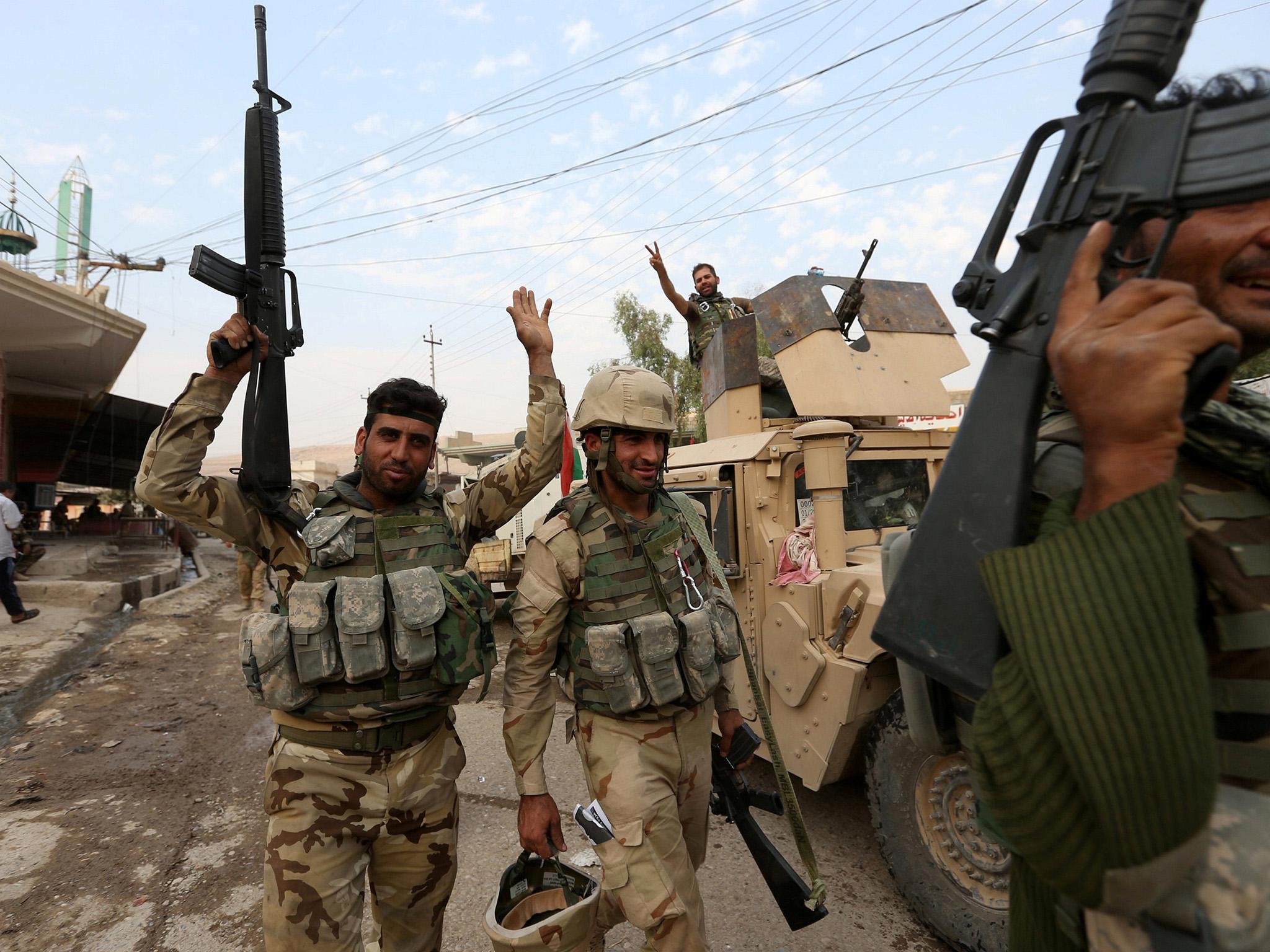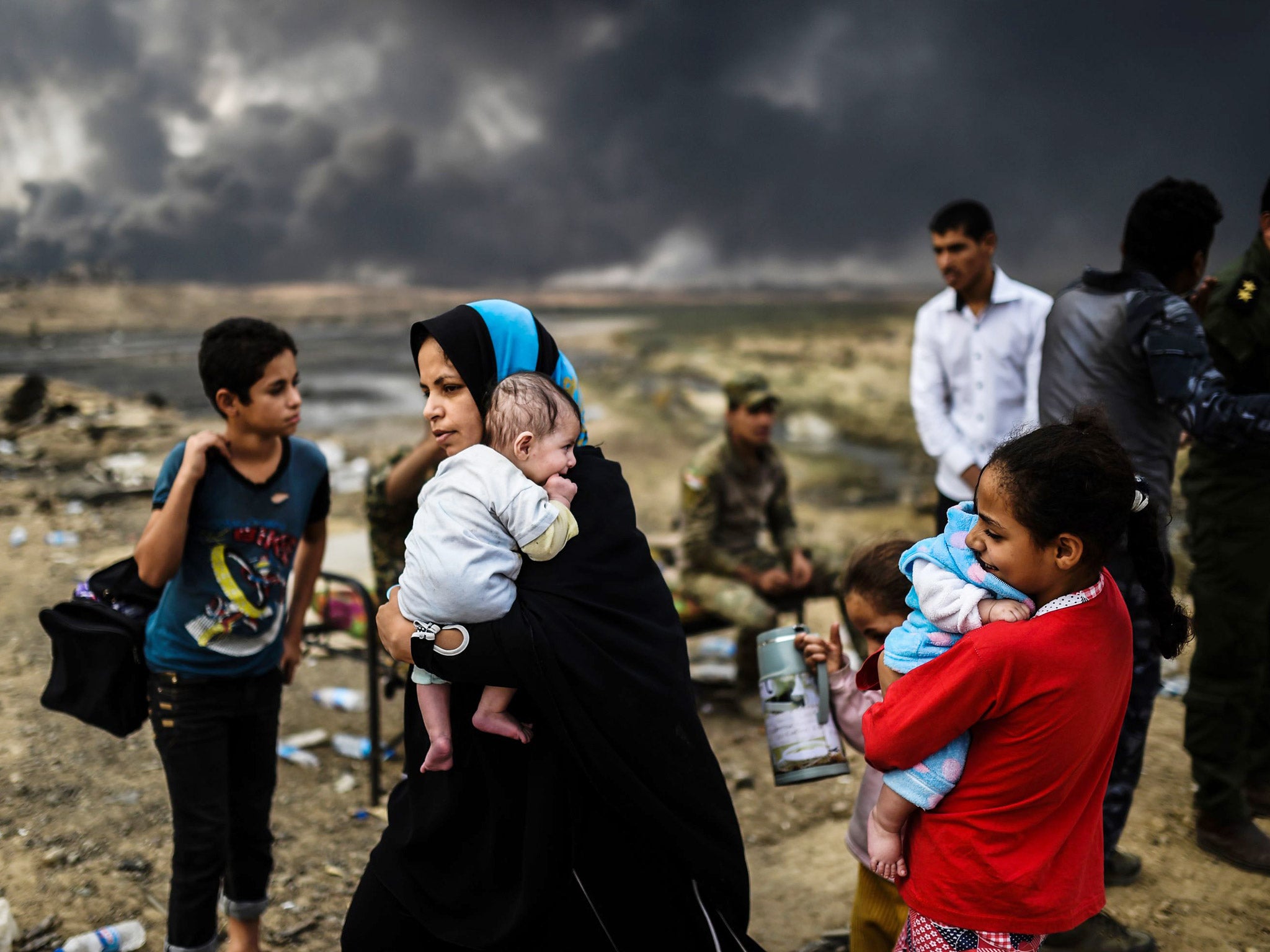Mosul offensive: Up to 900 Isis jihadis killed while more than 11,000 people are displaced in fighting
Backed with air and ground support from a US-led coalition, federal forces allied with Kurdish Peshmerga fighters have taken a string of towns and villages in a cautious but steady advance

Up to 900 Isis jihadis have been killed in the offensive to retake Mosul, according to the US, as camps around the Iraqi city fill with fleeing civilians.
Iraqis who fled their homes expressed joy at escaping Isis's brutal rule as they were given shelter and assistance, in some cases reuniting with relatives they had not seen in more than two years.
The offensive, launched on 17 October, is seeing tens of thousands of Iraqi fighters advancing on Mosul from the south, east and north in a bid to retake the last major Iraqi city under Isis control.
Backed with air and ground support from a US-led coalition, federal forces allied with Kurdish Peshmerga fighters have taken a string of towns and villages in a cautious but steady advance.
General Joseph Votel, who heads the US military's Central Command, told AFP that the offensive was inflicting a heavy toll on the jihadis. “Just in the operations over the last week and a half associated with Mosul, we estimate they've probably killed about 800-900 Islamic State fighters,” he said.
There are between 3,500 and 5,000 Isis jihadis in Mosul and up to another 2,000 in the broader area, according to US estimates.
The offensive has so far been concentrated in towns and villages around Mosul, with Iraqi forces later expected to breach city limits and engage the militants in street-to-street fighting.
Aid workers have warned of a major humanitarian crisis when fighting begins in earnest for Mosul, which is home to more than a million people, but thousands have already been fleeing surrounding areas.
Iraq's ministry of displacement and migration said on Thursday that more than 11,700 people had been displaced since the operation began.
“There's been quite a dramatic upturn in the last few days. As the Iraqi troops get closer to Mosul, more people are getting displaced, there are more populated areas,” said Karl Schembri, regional media adviser for the Norwegian Refugee Council.
At a camp in Khazir, about mid-way between Mosul and the Iraqi Kurdish capital Irbil, Massud Ismail Hassan peered through a chainlink fence, looking for family members as Peshmerga fighters registered the displaced.
“Once all these procedures are finished we will be able to give them food and drink and blankets we brought with us,” he said.
Other families had already found each other, and tearful relatives clutched hands through the links of the fence.
Saddam Dahham, who lived under Isis control in a village near Mosul for more than two years, fled to Khazir with his wife and their three children.
“We were not allowed to smoke, to use phones, not allowed to watch TV and we had to let our beards grow long,” the 36-year-old said.
One of the first things he did after arriving at the camp was joyfully shave the “heavy thing dangling from my chin. I'm finally going to resume a normal life,” the former lorry driver said.

Mr Schembri said the Norwegian Refugee Council, other aid agencies and the United Nations were planning for 200,000 people to be displaced in the next few days, though it may not reach that figure.
If anything close to 200,000 people are displaced in the immediate future, there will be a major shortage of places in camps.
“In terms of ... camp facilities, there are only spaces available for 60,000” people, Mr Schembri said.
Human Rights Watch on Thursday accused Kurdish authorities of arbitrarily detaining fleeing men and boys over 15 for indefinite periods as they checked them for possible ties to Isis.
Kurdish authorities “are ignoring basic due process guarantees,” said Lama Fakih, HRW's deputy Middle East director. “No one should be detained unless there is reason to suspect them personally of criminal activity.”
After seizing control of large parts of Iraq and neighbouring Syria in mid-2014, Isis declared a cross-border “caliphate”, imposed its harsh interpretation of Islamic law and committed widespread atrocities.
AFP
Join our commenting forum
Join thought-provoking conversations, follow other Independent readers and see their replies
Comments